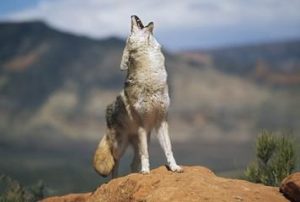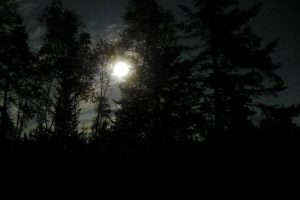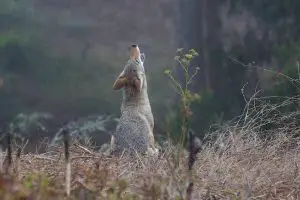Coyotes have long been a mystifying creature of the night. For hundreds of years people feared these animals, assuming that they were fearless and aggressive hunters that would attack at any given moment. One of the longest running myths about them is why they howl at night, and do coyotes howl at the moon? Standing outside on a late fall evening you can probably hear the piercing sound of the first howl ring out through the dark clear night as if the coyote were just yards away. As soon as the first howl sounds out, there will most likely be a responding howl heard within minutes, but from another coyote. Soon their howls and yips will blend together in a mixture of coyote song, sung loud for all to hear. But are they howling at the moon?
Why Howl?
 Coyotes are members of the Canidae family. Other members of the family include jackals, dogs, and the most notorious howlers – wolves. Howling is among a variety of vocal communication that is used by these canids to communicate everything from warning other coyotes to stay away, calling or attracting a mate, and even locating other members of their pack. Domesticated dogs can even be known to howl or make other similar sounds. Alaskan malamutes and huskies are the most well-known for displaying this behavior, which makes sense since they are the most closely related to wolves. Beagles and other hounds also do this, especially when in hunting situations.
Coyotes are members of the Canidae family. Other members of the family include jackals, dogs, and the most notorious howlers – wolves. Howling is among a variety of vocal communication that is used by these canids to communicate everything from warning other coyotes to stay away, calling or attracting a mate, and even locating other members of their pack. Domesticated dogs can even be known to howl or make other similar sounds. Alaskan malamutes and huskies are the most well-known for displaying this behavior, which makes sense since they are the most closely related to wolves. Beagles and other hounds also do this, especially when in hunting situations.
There are two most common reasons that you hear coyotes howl. One is that they are using this vocalization to advertise their home range or territory. Coyotes use other methods such as scent markings like urinating on their boundary and leaving scat for their competitors to find, but howling signals to other coyotes much further and lets them know that the territory is taken. The other reason a coyote howls is to locate a member of their pack. Coyote howls are much like human voices in that they are unique and recognizable by their family, or pack.
Singing to the Moon?
 Moonlight can affect coyote behavior for a few reasons. One of the explanations for why a coyote will howl at night when the moon is full or more visible has more to do with their regular habits than a cosmic connection to the moon above earth. There are three main coyote habits- hunting for food, protecting their territory, and finding a mate.
Moonlight can affect coyote behavior for a few reasons. One of the explanations for why a coyote will howl at night when the moon is full or more visible has more to do with their regular habits than a cosmic connection to the moon above earth. There are three main coyote habits- hunting for food, protecting their territory, and finding a mate.
When the moon is fuller on a clear night, coyotes have the advantage of seeing better and further in the dark. If the coyote happens to live in the forest regions, this provides an excellent opportunity that he will take advantage of to hunt for food into the night. In these regions, particularly in the Northeast where coyotes are larger, they will hunt together as a pack to take down larger prey such as deer that are also using the moonlight as a light source. When hunting in packs, coyotes will howl to signal to the other members where they are and when they are ready to attack.
This explanation also explains why coyotes howl at night in other regions. When the moon is bright in plains and desert regions, the coyote has enough light to scavenge his territory for food sources and an opportunity to hunt in cooler conditions. While the coyote is out hunting his territory, he will howl to other potential intruder coyotes that are looking for a moonlight meal that they are not welcome.
Coyote Sounds
 For such a small animal, they typically weigh 30-45 pounds – much smaller than a gray wolf, coyote howls are very loud and can be heard from miles away. Coyotes must be able to call out and be heard for a very long ways away since their territory can range several miles, depending on region and how dense the coyote population is. They also make other sounds such as a bark or yip, which can also be heard at night as they howl. Although it might sound like a very large pack of coyotes are taking part in the night time howl ritual, it can in fact be only two or three coyotes. All of their vocalizations combine to sound like a larger pack, which works in their favor to threaten off any predators or un welcome coyote visitors.
For such a small animal, they typically weigh 30-45 pounds – much smaller than a gray wolf, coyote howls are very loud and can be heard from miles away. Coyotes must be able to call out and be heard for a very long ways away since their territory can range several miles, depending on region and how dense the coyote population is. They also make other sounds such as a bark or yip, which can also be heard at night as they howl. Although it might sound like a very large pack of coyotes are taking part in the night time howl ritual, it can in fact be only two or three coyotes. All of their vocalizations combine to sound like a larger pack, which works in their favor to threaten off any predators or un welcome coyote visitors.
While moonlight can definitely cause a spike in night time coyote activity and sound, coyotes are not singing to the moon like the legends state.


